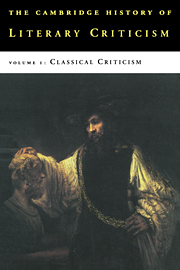Book contents
- Frontmatter
- 1 Early Greek views of poets and poetry
- 2 Language and meaning in archaic and classical Greece
- 3 Plato and poetry
- 4 Aristotle's poetics
- 5 The evolution of a theory of artistic prose
- 6 Hellenistic literary and philosophical scholarship
- 7 The growth of literature and criticism at Rome
- 8 Augustan Critics
- 9 Latin Criticism of the Early Empire
- 10 Greek Criticism of the Empire
- 11 Christianity and Criticism
- Bibliography
- Index
- References
11 - Christianity and Criticism
Published online by Cambridge University Press: 28 March 2008
- Frontmatter
- 1 Early Greek views of poets and poetry
- 2 Language and meaning in archaic and classical Greece
- 3 Plato and poetry
- 4 Aristotle's poetics
- 5 The evolution of a theory of artistic prose
- 6 Hellenistic literary and philosophical scholarship
- 7 The growth of literature and criticism at Rome
- 8 Augustan Critics
- 9 Latin Criticism of the Early Empire
- 10 Greek Criticism of the Empire
- 11 Christianity and Criticism
- Bibliography
- Index
- References
Summary
This chapter will survey a variety of intellectual movements in the time of the Roman Empire which are related to criticism, complementing what has been said in the previous chapter about neo-Platonism and extending the range into the writings of Fathers of the Church before Augustine and Jerome and the Latin grammarians and rhetoricians of late antiquity. Some of this material provides background for Medieval criticism, to be discussed in volume II; some developments are also of interest in that they seem to foreshadow critical issues of the twentieth century.
The search for meaning through interpretation
Greek intellectuals of the Roman Empire discussed epistemology and adumbrated semiotic and hermeneutic theories of interpretation. There was, however, wide difference of opinion among them. At one extreme lies the tradition of Pyrrhonian scepticism, which had begun at the end of the fourth century BC and influenced the Academic school of the Hellenistic period in its controversy with Stoic belief that certainty could be obtained from sense perception. Among surviving works of the Classical period, scepticism is best represented in Cicero's Academies. The fullest exposition of a radical scepticism is, however, found in the writings of Sextus Empiricus in the late second century of the Christian era. Sextus rejected sense perception as a basis of knowledge, and with it all claims for certainty in logic, physics, and ethics. The sceptical principles set forth in Sextus' Outlines of Pyrrhonism are applied in detail in Against the Dogmatists to undermine the validity of teaching in grammar, rhetoric, mathematics, astronomy, and music.
- Type
- Chapter
- Information
- The Cambridge History of Literary Criticism , pp. 330 - 346Publisher: Cambridge University PressPrint publication year: 1990

